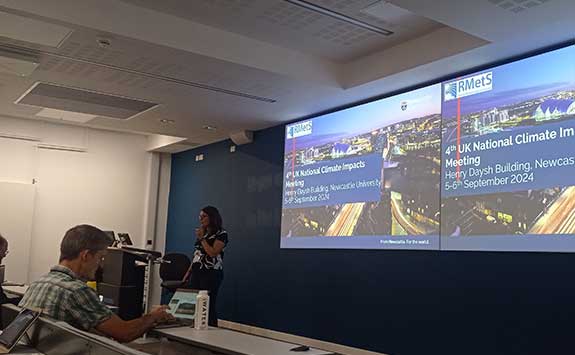Newcastle University hosts 4th UK National Climate Impacts Meeting
Written by Dr Colin Manning
1 October 2024
The UK National Climate Impacts Meeting was recently hosted by Newcastle University in partnership with the Royal Meteorological Society (RMetS) on September 5-6th 2024 in the Henry Daysh Building.
The event was held free of charge to participants due to financial support from Newcastle University’s Centre for Climate and Environmental Resilience (CCER) as well as from the RMetS. The CCER also sponsored the attendance of 9 ECRs by funding accommodation costs. This meeting brought over 120 participants together from a range of disciplines in the academic community, industry practitioners, policy makers and other organisations involved in informing climate adaptation and net zero planning.The 30 oral presentations and 28 poster presentations from participants with varying perspectives on climate risks and adaptation produced vigorous discussions around the complexities of impacts, quantifying risk, and how to best inform adaptation.
Here we outline some of the key themes and takeaways from the meeting.
Key themes and takeaways from the meeting
A theme that arose frequently was the need to understand the complexity of impacts and the influence of cascading and compounding drivers of varying origin, including weather and environmental hazards, economic and population factors as well as inter-sectoral dependencies. A key question is how these factors can combine to influence risks and whether adaptations can be designed with these in mind. A key example was how heat-related health burdens may be affected by increasing temperature extremes alongside an ageing population, while power cuts due to heat waves may leave people more vulnerable if relying on air-conditioning for cooling.

Throughout the meeting, challenges for effective adaptation were discussed, including a lack of impact and vulnerability data in many sectors required to quantify a system’s resilience and a lack of empirical evidence for adaptation measures needed to test their cost-effectiveness. Participants highlighted the need to prioritize the keeping of consistent records of impacts and related hazards and to develop risk indicators for monitoring of complex risks. The benefits of doing so were highlighted by operators of electricity networks whose multi-year impact datasets are being used to develop resilience metrics and to quantify the compounding effects of meteorological hazards on their networks.
Process-based models are also being used to inform adaptation in a wide range of sectors. Many examples were given of models incorporating multiple meteorological and environmental drivers of impacts (e.g. forestry decline, energy production, power outages, disruption of transport networks, flooding) alongside external factors such as consumer behaviour, technology advancements and economics (e.g. food sector). These approaches can be used in a range of scenarios to help stakeholders assess the cost-effectiveness of potential investment against other competing interests to make informed decisions around planning and adaptation measures. However, making robust decisions on required adaptation to maintain current resilience is a complicated process: it largely depends on global societal response to mitigating greenhouse gases. Discussions also took place on what the minimum levels of warming might be and if decisions made now may remain robust in a stable climate compared to one that is warming. It was shown that even with strong, and maybe unrealistic, mitigation scenarios we are likely already committed to at least 1.5oC of global warming above preindustrial levels, which should act as the minimum level of warming that we should adapt to.
Uncertainties in climate models were also a key discussion point, particularly their ability to represent certain weather extremes and possible climate tipping points that can lead to irreversible effects (e.g. AMOC shutdown, Amazon dieback), which are not included in all climate model simulations. Thus, for different reasons, climate models underestimate the range of future risks. Calls were made to use multiple strands of evidence for informing climate adaptation and mitigation. These include quantitative estimates of future changes alongside qualitative narrative approaches that focus on plausibility and what could possibly happen in the future.
Finally, an interactive session focussed on climate impacts education, starting with four short talks representing various aspects, from the Climate Ambassadors' Scheme, the Royal Meteorological Society, Professional Development Activities at Newcastle University and some Energy Sector engagement from the University of Reading. This then led into a panel discussion with conference participants which focussed on the importance of climate education in schools and for the public and how participants could contribute towards this. Panellists also discussed the importance of open impact data from industries needing to rapidly upskill in climate science to respond to mitigation and adaptation challenges (e.g. from the health, infrastructure and finance sectors). Access to this type of data would allow scientists to support these industries in the best way possible with open-access climate resources. The challenge of ensuring necessary standards in climate risk assessments in an increasingly commercial landscape was raised - particularly from companies that can make money selling climate data products without the necessary knowledge of how the climate data should be used. It was agreed that academics can do more to showcase best practise for the use of meteorological data for climate impact applications outside of writing journal articles.
Moving forward, it is important to maintain and grow this community which brings valuable interaction and mutual learning between members of the academic community, industry practitioners and policy makers. Work around climate risks and adaptation requires multiple perspectives, co-development of projects and a vibrant community to maximise potential and it is meetings such as this one that help to develop this. We are therefore extremely grateful for the financial support from Newcastle University’s CCER and the Royal Meteorological Society. This funding allowed participants to attend free of charge, provided accommodation to PhD students with little funding, and brought participants together in an additional networking event.
